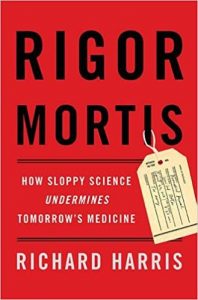 The week at Retraction Watch featured a study of why researchers commit misconduct, and the story of former Northwestern scientist who sued the university for defamation. Here’s what was happening elsewhere: Continue reading Weekend reads: Death of a cancer lab; women economists’ papers are more readable; self-correction grows
The week at Retraction Watch featured a study of why researchers commit misconduct, and the story of former Northwestern scientist who sued the university for defamation. Here’s what was happening elsewhere: Continue reading Weekend reads: Death of a cancer lab; women economists’ papers are more readable; self-correction grows
Author: Ivan Oransky
Why do researchers commit misconduct? A new preprint offers some clues

“Why Do Scientists Fabricate And Falsify Data?” That’s the start of the title of a new preprint posted on bioRxiv this week by researchers whose names Retraction Watch readers will likely find familiar. Daniele Fanelli, Rodrigo Costas, Ferric Fang (a member of the board of directors of our parent non-profit organization), Arturo Casadevall, and Elisabeth Bik have all studied misconduct, retractions, and bias. In the new preprint, they used a set of papers from PLOS ONE shown in earlier research to have included manipulated images to test what factors were linked to such misconduct. The results confirmed some earlier work, but also provided some evidence contradicting previous findings. We spoke to Fanelli by email.
Retraction Watch (RW): This paper builds on a previous study by three of your co-authors, on the rate of inappropriate image manipulation in the literature. Can you explain how it took advantage of those findings, and why that was an important data set? Continue reading Why do researchers commit misconduct? A new preprint offers some clues
Weekend reads: When reproducibility is weaponized; Internet-based paraphrasing tools; go parasites!
 The week at Retraction Watch featured a predatory journal sting involving a fake disorder from Seinfeld, and a study with disturbing findings about how retracted papers are cited. Here’s what was happening elsewhere: Continue reading Weekend reads: When reproducibility is weaponized; Internet-based paraphrasing tools; go parasites!
The week at Retraction Watch featured a predatory journal sting involving a fake disorder from Seinfeld, and a study with disturbing findings about how retracted papers are cited. Here’s what was happening elsewhere: Continue reading Weekend reads: When reproducibility is weaponized; Internet-based paraphrasing tools; go parasites!
“Failure is an essential part of science:” A Q&A with the author of a new book on reproducibility
 Reproducibility is everywhere recently, from the pages of scientific journals to the halls of the National Academy of Sciences, and today it lands in bookstores across the U.S. Longtime NPR correspondent Richard Harris has written Rigor Mortis (Basic Books), which is published today. (Full disclosure: I blurbed the book, writing that “Harris deftly weaves gripping tales of sleuthing with possible paths out of what some call a crisis.”) Harris answered some questions about the book, and the larger issues, for us.
Reproducibility is everywhere recently, from the pages of scientific journals to the halls of the National Academy of Sciences, and today it lands in bookstores across the U.S. Longtime NPR correspondent Richard Harris has written Rigor Mortis (Basic Books), which is published today. (Full disclosure: I blurbed the book, writing that “Harris deftly weaves gripping tales of sleuthing with possible paths out of what some call a crisis.”) Harris answered some questions about the book, and the larger issues, for us.
Retraction Watch (RW): Rigor Mortis begins with the story of the 2012 Nature paper by C. Glenn Begley and Lee Ellis that is now famous for sounding the alarm about reproducibility in basic cancer research. But as you document, this is not a problem that began in 2012. When did scientists first start realizing there was a problem? Continue reading “Failure is an essential part of science:” A Q&A with the author of a new book on reproducibility
“Publications of questionable scientific value:” A scientist models a potential prom date

Eve Armstrong had an important question: How would things have turned out if she had summoned the nerve to ask a certain Barry Cottonfield to her high school’s junior prom in 1997? Continue reading “Publications of questionable scientific value:” A scientist models a potential prom date
Weekend reads: What’s the real rate of misconduct?; research parasites win awards; preprints’ watershed moment
 The week at Retraction Watch featured the strange story of a reappearing retracted study, and the retraction of a study showing a link between watching violent cartoons and verbal skills. Here’s what was happening elsewhere: Continue reading Weekend reads: What’s the real rate of misconduct?; research parasites win awards; preprints’ watershed moment
The week at Retraction Watch featured the strange story of a reappearing retracted study, and the retraction of a study showing a link between watching violent cartoons and verbal skills. Here’s what was happening elsewhere: Continue reading Weekend reads: What’s the real rate of misconduct?; research parasites win awards; preprints’ watershed moment
“A Course In Deception:” Scientist’s novel takes on research misconduct

Jana Rieger is a researcher in Edmonton, Alberta. And now, she’s also a novelist. Her new book, “A Course in Deception,” draws on her experiences in science, and weaves a tale of how greed and pressures to publish can lead to even worse outcomes than the sort we write about at Retraction Watch. We interviewed Rieger about the novel.
Retraction Watch (RW): You tell the book from the point of a view of a fictional first-person narrator, a sleep researcher in Edmonton, Alberta, Canada. You, too, are a researcher in Edmonton. Is there any Jana Rieger in Mackenzie Smith? Continue reading “A Course In Deception:” Scientist’s novel takes on research misconduct
Weekend reads: The risks of spotlighting reproducibility; harassment = scientific misconduct?; trouble with funnel plots
 The week at Retraction Watch featured the case of a peer review nightmare, and a story about harassment by a would-be scientific critic. Here’s what was happening elsewhere: Continue reading Weekend reads: The risks of spotlighting reproducibility; harassment = scientific misconduct?; trouble with funnel plots
The week at Retraction Watch featured the case of a peer review nightmare, and a story about harassment by a would-be scientific critic. Here’s what was happening elsewhere: Continue reading Weekend reads: The risks of spotlighting reproducibility; harassment = scientific misconduct?; trouble with funnel plots
Weekend reads: Investigations need sunlight; should we name fraudster names?; how to kill predatory journals
 The week at Retraction Watch featured a lawsuit threat following criticism of a popular education program, and the new editor of PLOS ONE’s explanation of why submissions are down. Here’s what was happening elsewhere: Continue reading Weekend reads: Investigations need sunlight; should we name fraudster names?; how to kill predatory journals
The week at Retraction Watch featured a lawsuit threat following criticism of a popular education program, and the new editor of PLOS ONE’s explanation of why submissions are down. Here’s what was happening elsewhere: Continue reading Weekend reads: Investigations need sunlight; should we name fraudster names?; how to kill predatory journals
Weekend reads: A publisher sends the wrong message on data sharing; jail for scientific fraud; pigs fly
 The week at Retraction Watch featured three new ways companies are trying to scam authors, and a look at why one journal is publishing a running tally of their retractions. Here’s what was happening elsewhere: Continue reading Weekend reads: A publisher sends the wrong message on data sharing; jail for scientific fraud; pigs fly
The week at Retraction Watch featured three new ways companies are trying to scam authors, and a look at why one journal is publishing a running tally of their retractions. Here’s what was happening elsewhere: Continue reading Weekend reads: A publisher sends the wrong message on data sharing; jail for scientific fraud; pigs fly